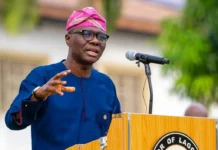 Raises panel on new industrial policy
Raises panel on new industrial policy
THE oil and gas industry may in the nearest future lose its prime place as the key driver of the Nigerian economy to the mining sector.
On all fronts, the Federal Government says the solid mineral sector has more economic benefits, very attractive to investors and environmentally friendlier than the oil and gas industry, which now dominates the economy.
Consequently, the government is convinced that its plan to diversify the economy would be better and promptly realised if more resources are deployed into it through the creation of an enabling environment for current players to continue in business and for potential investors to stake their resources.
The Minister of Mines and Steel Development, Mr. Musa Mohammed Sada, who spoke on the new move of the government at the weekend, asserted that “by its nature, the mining industry has the capacity for both backward and forward value chains that can sustain wealth creation, employment generation, poverty reduction, development of our rural communities and production of feedstock for local industries.”
The Federal Government has unveiled plans to diversify the nation’s economic base from reliance on oil and gas to focus on the solid mineral sector.
He added that if these natural resources are managed and exploited, they have the potential to ensure rapid economic growth and a huge source of non-oil revenue.
This new reasoning is believed to have informed the minister’s visit to Lafarge West African Portland Company’s (WAPCO) quarry site in Ewekoro, Ogun State, where he hinted of government’s readiness to partner with the firm to use coal to generate electricity.
Sada declared during the tour that Nigeria is richly blessed with a wide range of solid minerals capable of increasing its revenue generation.
He said the government had given due attention to the development of the mining industry in view of its importance to the realisation of the transformation agenda of the administration of President Goodluck Jonathan.
Also at the weekend, the government has inaugurated a committee to formulate a new industrial policy frame-work to facilitate the industrialisation of the country.
The panel, headed by Prof. Mike Kwanashe of the Department of Economics, Ahmadu Bello University (ABU), Zaria, will submit the draft policy document in May.
Membership of the committee was drawn from the public and private sectors, including Manufacturing Association of Nigeria, Nigerian Association of Chambers of Commerce, Industry, Mines and Agriculture, and industry leaders in various sectors of the economy.
The Minister of Trade and Investment, Mr. Olusegun Aganga, who inaugurated the panel, said it would among others identify factors militating against the implementation of previous industrial policies; formulate sector specific policies based on areas where Nigeria has comparative and competitive advantages; propose policies for the patronage of locally-manufactured goods; identify ways of enhancing the utilisation of raw materials for the production of intermediate and finished goods and propose specific policies for Small and Medium Enterprises (SMEs) and Free Trade Zones.
For would-be investors in the solid mineral sector and the current operators, Sada pledged that the government would provide them adequate infrastructure to encourage them set up new businesses and remain in operation.
“If we can come as government to support the solid mineral sector, the economy will surely move forward. The government is aware that most companies in the country are providing their own power. We are serious about the plan to increase power generation in the country. We are planning to partner with Lafarge to explore the conversion of coal to power.
“We want to prove that the mining sector can drive the economy. We are interested in providing employment through it.
“We are equally working with the operators in relation with community issues to ensure that we do not encounter the same problem in the oil and gas sector,” he said.
The minister appealed to investors to stake their resources in the sector, adding that the government had already put in place both regulatory and infrastructural frame-work to develop the industry.
Sada listed such measures as the provision of favourable and good geology; transparent and easy access to mineral rights; attractive incentives and guaranteed security of tenure; availability of mining related infrastructure in areas with economically-viable mineral deposits; privatisation and liberalisation of the minerals industry with government playing only regulatory roles; readily available geo-sciences data for prospective investors; stable political and social climate to safeguard investments; and availability of indigenous professionals and technical manpower as well as the demonstration of the political will to diversify its economy through mineral exploitation.
The minister added that the Nigerian Minerals and Mining Act of 2007 and mining regulations had been perfected to meet international best practices so that there would be security of tenure, greater transparency in granting access, competitive fiscal terms and the encouragement of industry led by the private sector.
He assured of various incentives ranging from capital allowances up to 95 per cent of qualifying capital expenditure, waiver of customs and import duties for plants, machinery and equipment for mining operations, three to five years’ tax holidays as applicable, tax concessions and ease of entry into the country rolled out for potential investors by the government.
WAPCO Managing Director and Chief Executive Officer, Mr. Joe Hudson, said the company would invest more in the cement industry.
Hudson said that the company is “looking for opportunity for growth. We are still investing in the Nigerian economy. We are looking at coal production. We hope that our partnership with the Ministry of Mines and Steel will be a fruitful one.”
Aganga told Kwanashe panel that “Nigeria’s industrial sector has experienced setbacks for long and has been afflicted by weaknesses arising from inefficiencies in the provision of public utilities. The energy crisis, excessive import dependence, lack of clear strategy for areas where Nigeria has competitive and comparative advantages, and poor sectoral linkages, are some of the factors that have exacerbated the problems of the sector.
“These afflictions have manifested in low capacity utilisation, low contribution to Gross Domestic Product (GDP), depleted financial base, high production costs and unemployment.”




